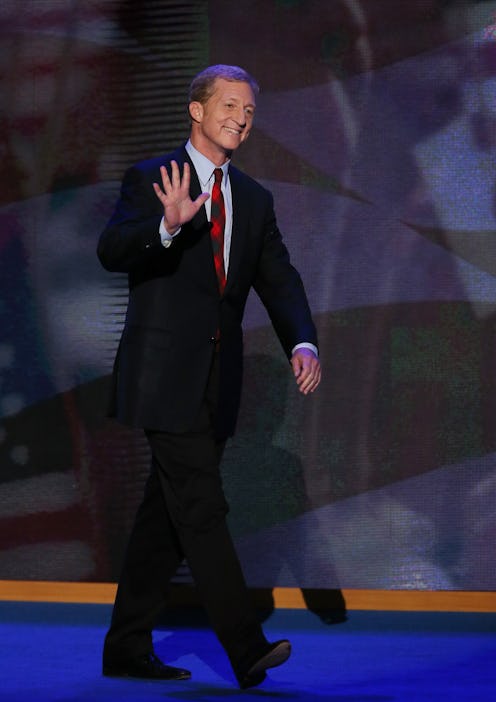News
This Advocacy Group Can Undo Political Campaigns
It may sound like the plot of a Captain Planet reboot, but this is real life. An environmental advocacy group backed by billionaire Tom Steyer, NextGen Climate, will launch a seven-state attack on Republican "science deniers" during this year's midterm elections. Their aggressive $100 million campaign initiative could boost the electoral campaigns of some governors, and even help determine which party controls the Senate in the November midterms.
According to its website, "NextGen Climate is a non-partisan organization focused on bringing climate change to the forefront of America’s politics." With Steyer's deep pockets, the company has the means to influence the climate change agenda on a political level — not just by supporting candidates and policymakers aligned with their cause, but also by exposing and hindering those who are not.
"We want 2014 to be a pivot year for climate — the year we can demonstrate that you can use climate change as a wedge issue to win in political races," Democratic consultant Chris Lehane, who is advising Steyer, told reporters on Wednesday.
The environmental-group-billionaire team has already seen success with its strategy to emphasize climate change with three elections in 2013. They spent $11 million with the goal of defeating GOP candidate Ken Cuccinelli, a so-called "science denier," at the Virginia governor's race. "The race in 2013 in Virginia was a beta test for 2014," Lehane said at the press briefing. "It provided us the political paradigm to model our other races off of."
The opposing camp, like the pro-business billionaire Koch brothers, are also campaigning aggressively to thwart climate change policy. So now Steyer and NextGen Climate are fighting fire with fire — or in this case, money.
As they did with the Virginia election, Steyer and NextGen Climate will pour their funds into media campaigns to try and influence Senate races in pivotal states, ones that have clear pro-climate change and pro-science candidates. The team will stay out of races where climate change plays a lesser role. If their specific plan is anything like what they pulled off in Virginia, then we can expect TV, mail, and field operations and a strategy called "nano-targeting" that tailors messaging to discrete voting groups.
Here's what NextGen Climate's "attack" map looks like, broken down by state and candidate. First, the Senate races...
Iowa
Giving a helping hand to: Democratic nominee Bruce Braley, who writes on his website: "We must continue to invest in new clean energy technologies and energy efficiency, including and renewable energy, carbon capture and sequestration, electric and other advanced technology vehicles, and basic scientific research and development."
Opposing: GOP candidates Mark Jacobs, who the Des Moines Register reported was "not convinced" of climate change and "even further less convinced there is anything we can necessarily do about that," and Joni Ernst, who is not convinced that humans are responsible for climate change.
New Hampshire
Giving a helping hand to: Democratic nominee Jeanne Shaheen, who introduced the bipartisan Energy Savings and Industrial Competitiveness Act of 2011, which "contains a broad package of low-cost tools that would reduce barriers for businesses, homeowners, and consumers looking to adopt off-the-shelf energy efficiency technologies that will save them money."
Opposing: GOP candidate Scott Brown, who urged Republican senators to kill Shaheen's bipartisan energy efficiency bill so she wouldn't have anything to run on.
Colorado
Giving a helping hand to: Democratic candidate Mark Udall, who lists reducing reliance on foreign oil and reducing the effects of climate change as two of his priorities.
Opposing: GOP candidate Cory Gardner, who once told The Coloradoan , "I think the climate is changing, but I don’t believe humans are causing that change to the extent that’s been in the news."
Michigan
Giving a helping hand to: Democratic candidate Gary Peters, who writes on his webstite: "In Congress, I've proudly fought to pass legislation to reduce America's carbon footprint, preserve our national resources and responsibly break our national addiction to foreign fossil fuels."
Opposing: GOP nominee Terri Lynn Land, whose spokesperson told The Washington Post :
"Terri believes that there should be a healthy and educated debate on the impact of human activity on our environment, but she does not agree with radical liberals like Tom Steyer and Congressman Peters on the extent of the effect of human behavior on our climate. While Terri continues to focus on jobs, the economy and protecting the Great Lakes, Congressman Peters has instead focused his energy on selling out Michigan workers and adopting the radical agenda of California billionaire Tom Steyer."
As for the governors' races...
Pennsylvania
Giving a helping hand to: Democratic candidate Katie McGinty, who was a long-time senior advisor on environmental matters to Senator and former Vice President Al Gore.
Opposing: Tom Corbett, whose administration has ignored a Pennsylvania law that requires the state to address climate change and who called President Obama's climate change proposal a "war on coal" and a "war on jobs."
Florida
Giving a helping hand to: Democratic candidate Charlie Crist, who promises on his website to "protect the Everglades and our beaches, and ensure that every Floridian has clean air to breathe and clean water to drink."
Opposing: GOP candidate Rick Scott, who once told reporters, "I've not been convinced that there's any man-made climate change.... Nothing's convinced me that there is."
Maine
Giving a helping hand to: Democratic candidate Mike Michaud, who writes on his website that he prioritizes conservation, investing in new energy sources, and "reducing our carbon footprint and the threat that global warming, pollution, and toxic chemicals pose to Maine."
Opposing: GOP candidate Paul LePage, a tea partier who vetoed a bill that would have approved of a study to prepare Maine's communities and businesses for the effects of climate change.
